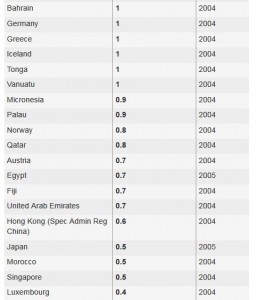Norwegians believe penalties for serious crimes in their country should be tightened in the wake of a shooting and bomb attack that killed 77 people in July, an opinion poll showed Monday.
In a survey of 1,283 people conducted six days after the July 22 attack, 65.5 percent said the penalties were “too low” and only 23.8 percent believed they were suitable, newspaper Verdens Gang reported.
Anders Behring Breivik, the 32-year old anti-Islamic immigration zealot who has confessed to the bombing in Oslo and shooting spree on a nearby island, has been charged by police with terrorism, which carries a sentence of up to 21 years.
Such reactions are understandable. Perhaps Norway’s notoriously lenient penal code should be toughened, though according to every source I’ve found, Norway has one of the lowest homicide rates in the world, under 1 per 100,000 population. When you’re that close to zero, the costs of lowering the stat may outweigh the benefits.  Whatever you believe about punishment, deterrence, rehabilitation, and the rest of criminology, you have to acknowledge the risks of overreacting to tragedies. For example:
Whatever you believe about punishment, deterrence, rehabilitation, and the rest of criminology, you have to acknowledge the risks of overreacting to tragedies. For example:
Per Sandberg, chairman of the parliament’s Justice Committee, said stiffer sentencing will be on the agenda when party leaders resume debate on August 15.
“I am sure when we come to August 15 the political discussion will be about sentences, searches by the police and everything else around this case,” Sandberg told Reuters.
“My party has always wanted that. I believe there will be new measures.”
Here we have a politician already stretching the public’s demand for longer sentences into a mandate for increased surveillance and “everything else.” That politician, by the way, belongs to the right-wing Progress Party, which once counted Breivik among its members, so he’s hoping for a twofer: a chance to distance the party from the villain by calling for harsh punishment and an excuse to push through laws that his party “always wanted” — laws whose enforcement will probably fall hardest on the Norwegian Muslims whom Breivik hated. Nice.
But Norway may not take the path the United States charged down after 9/11:
Justice Minister Knut Storberget told VG he was “not surprised” by the calls for stricter laws. “We must listen and have a debate, while not draw hasty conclusions… it’s important that policy isn’t shaped in a state of panic.”
Hanne Marthe Narud, a political scientist at the University of Oslo, said Norway’s parliament is likely to stand against immediate public calls for harsher sentencing and more surveillance.
“A lot of these attitudes we see now are reflections of the terror event,” she told Reuters, referring to the VG poll.
“I don’t think the politicians will change legislation on this point as a spontaneous reaction. It may be considered, but there will be a broad debate first.”
Norwegian diplomat Eirik Bergesen, who was in Washington, D.C., on 9/11, wrote the following a week ago:
The typical step a society takes after a terrorist attack is towards stricter security measures. It happened after 9/11 and has continued to happen in the US in the decade that is soon to have passed. Obviously, as a symbol of Western civilisation the US is a more prominent terrorist target, and concise parallels are difficult to draw. However, Norway has surprised foreign observers I have spoken to, and maybe even ourselves, in that we instead have managed to take a step back. Through careful reflection proving that there are other ways of maintaining order than merely through more rules and regulations. That increasing the social trust, in a society that already enjoys amongst the highest levels of social trust in the world, is a more rewarding option.
I hope that careful reflection prevails.



